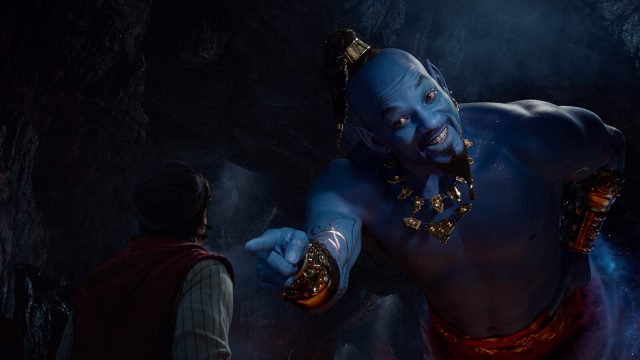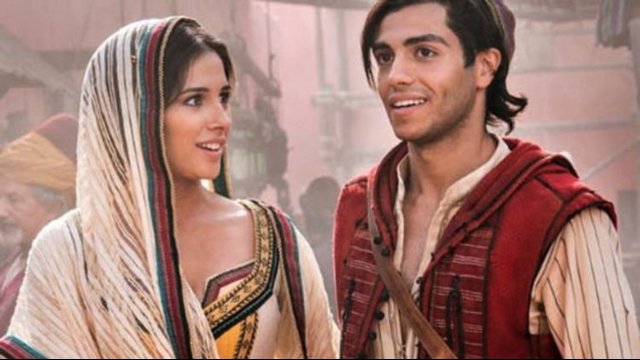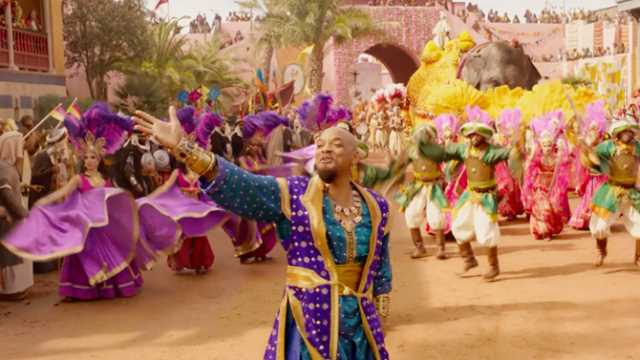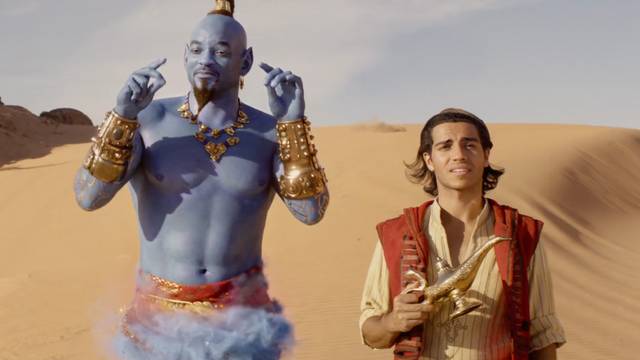The first step is to accept reality. Disney’s Aladdin remake exists, and nobody could stop that happening. What now? Should viewers just tear their hair out that any new version got made at all? That could be one option. However, skipping straight to acceptance works best. Since this is a thing, how should they have done it? Did they do it that way? Despite the fact that it will never capture the energy of the late Robin Williams, is it the best possible remake of the material that it can be?
It’s a safe assumption that nobody actually wanted Williams’ original dialogue placed in the mouth of some new CG thing. The best alternative involves getting someone whose star persona also makes them larger than life. Will Smith, as one of the last big movie stars we have who can get a movie made based on his name regardless of premise. Smith may not be a comedian, but he has starred in comedies. As a music star he’s ostensibly qualified for a musical.

The main thing is that Smith projects likability. Whatever the role he’s in, viewers usually feel like he could be their best friend. Or, occasionally, their dream dad. Here he’s both, opening the movie as a merchant telling the story to his children. In doing so, he also makes explicit the deleted notion from the animated original that the Genie and the narrator are one.
RELATED: Review: It Chapter Two Brings Scary Therapy From an Evil Clown
Relative newcomer Mena Massoud is Aladdin, and he’s…okay. A little wooden at first; better in the middle section where he’s required to appear more conflicted. The script lets him down for the climax, which makes the final trick against villain Jafar a shared idea with the Genie, rather than entirely Aladdin’s. Maybe Smith, as the big name, was somehow required to save the day too, but it weakens Aladdin’s heroic arc.
Jafar has arguably changed the most of all the characters. Played by Dutch-Tunisian actor Marwen Kanzari, he’s much more aggressively macho, and cranks up the volume in a manner recalling Aasif Mandvi in The Last Airbender. Rather than a devious drama queen, he’s a frustrated alpha male who wishes the Sultan would wage more wars and oppress more poor people. Also, he doesn’t sing. Admittedly, the “read my lips” joke was already old even in 1992, but not getting the evil “Prince Ali” reprise makes me slightly sad.

Thankfully, Naomi Scott can sing as Princess Jasmine, because she gets a whole new number, “Speechless.” It’s a powerful cry of girl power…and one that’s also at odds with the way the movie makes Jasmine super-tentative early in the movie. If she’s braver and more feminist, why is this one afraid of jumping off rooftops where her predecessor wasn’t?
RELATED: The Rise of Skywalker Sith Trooper Action Figure Review
The original story of Aladdin was a Syrian tale set in China and added to the Arabian Nights by a Frenchman, so nobody should be shocked that the fictional city of Agrabah looks kind of all over the place, style-wise. I suspect Disney saw a way here to play to the Indian market, as the way dialogue segues into song and dance here feels more like a Bollywood musical than a cartoon. It worked: in India, it was the third-most successful foreign film, behind only the two big Marvel Studios releases. Bollywood movies also tend to avoid kissing scenes, expressing love and lust in dance form. And the kiss here is carefully cut around, making it more implied and less explicit than even the animated version.
The tricky thing with live-action musicals involves the inherently artificial nature of adding song and dance at all. Do you embrace the artifice, or try to pretend a world where people burst out into tunes is just an alternate reality? Aladdin mostly does the former. Agrabah is a very big, expensive set, and in 4K we get to see every corner and jewel involved. But it is emphatically a set; and it never feels like a world real humans inhabit when not uttering their lines. Monty Python typically got more authenticity on lower budgets by adding more mud to everyone’s clothes, while here the costumes are the point. Production designer Gemma Jackson has basically created a massive, digitally extended, stage musical set.
RELATED: Deadpool Takes Amusing Advantage of Ghost Rider in This Diorama
For director Guy Ritchie, who recently retold the story of King Arthur as a “street rat,” this level of unreality is a new look. It isn’t clear he knows how to apportion the budget in a situation like this, as the climax frequently feels like it has to make excuses for running out of funds. An added bit where the parrot Iago turns kaiju size makes for a nice tribute to final mini-boss levels in video games. But the boss battle after that should then be Godzilla level. And that, it ain’t. The new flourishes can be fun, but when the old beats feel obligatory — like when Smith feels forced into saying a signature Williams line rather than his own — it’s off-key karaoke.

An included deleted song, “Desert Moon,” doesn’t do much, but Mena Massoud’s production diary is a delight. Using a secured cellphone, the star documented his own behind-the-scenes journey with all the enthusiasm of a first-time star. More Blu-rays should include extras like this one. Deleted scenes showcase a bit more of the movie’s fictional war politics, and one of the goofy European prince who courts Jasmine incompetently.
Bonus music videos include a Spanish version of “A Whole New World,” and “Speechless.” The latter plays all the more impressively when one watches the making-of, and it shows that Scott sang the whole thing live in one take, on set.
RELATED: Into the Spider-Verse’s Peter B. Parker Gets a Flattering Toy
Anyone reared on the original movie loves these songs and this story already. Watching the remake is like watching a good regional theater company try to restage a favorite play. Will it be the best, or even close? Not really. But it can be fun to watch people try. So Disney releasing a 4K of the original alongside the remake makes for a very strange choice. Most fans will go for the original.
Buy/Rent/Pass? Rent. You know you’re curious, and it’s good fun at least on the first time through.





